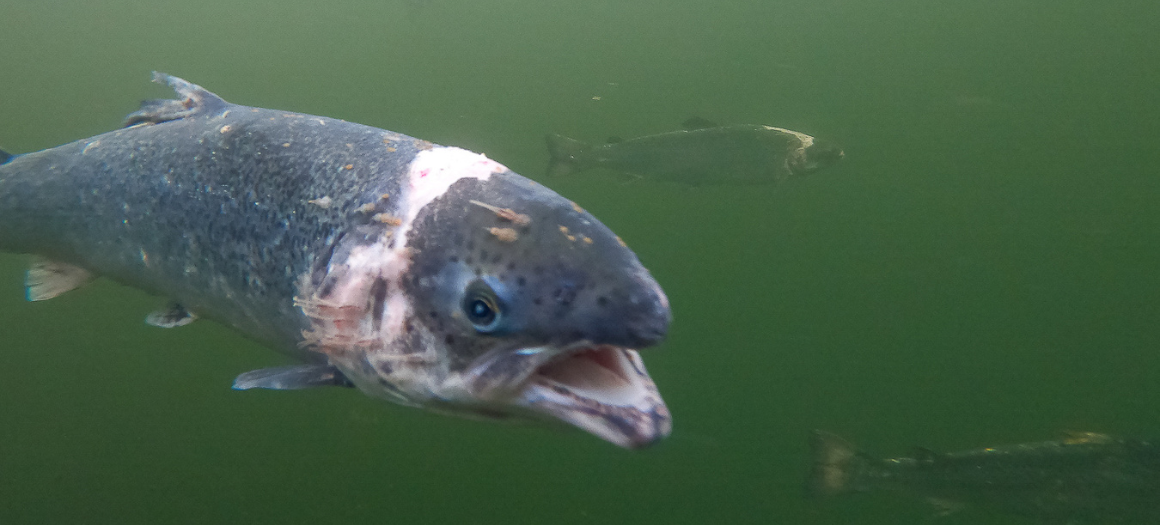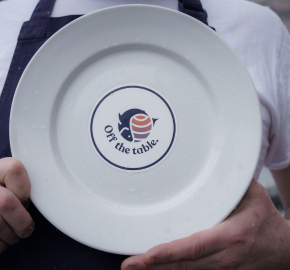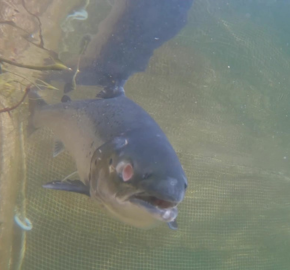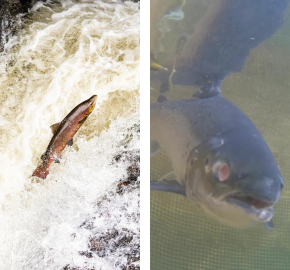WildFish make legal complaint to environment watchdog for SEPA’s failure to protect endangered wild salmon from sea lice parasites

WildFish and Coastal Communities Network (Scotland) have submitted a formal complaint to Environmental Standards Scotland (ESS), over “inadequate” proposals by the Scottish Environment Protection Agency (SEPA) to control sea lice from marine salmon and trout farms and protect wild salmon and sea trout.
The complaint has been made about SEPA’s proposed regulatory framework, Managing interactions between sea lice from finfish farms and wild salmonids, the latest version of which was published in December 2023; the same month that the International Union for the Conservation of Nature (IUCN) reclassified Scottish Atlantic salmon populations as ‘endangered’.
One of the key risks to wild Atlantic salmon outlined by the IUCN at the time of reclassification was “mortality due to salmon lice from salmon farms”, which the body noted was “of great concern”. A type of marine parasite, high levels of sea lice on salmon farms are a risk to both farmed fish and wild fish populations; as few as two lice can fatally damage a young wild salmon.
Rachel Mulrenan, Scotland Director of WildFish, said: “Harm continues to be being caused to wild Atlantic salmon and sea trout by sea lice emanating from Scottish marine salmon farms. Regrettably, after years of dithering and denial from the Scottish Government, two Scottish Parliamentary enquiries and now two rounds of public consultation, SEPA’s planned approach to controlling the scourge of sea lice from salmon farms remains wholly inadequate.
It’s clear that SEPA has been constrained by the underlying unwillingness of the Scottish Government to allow it to take any steps that might hinder the rapid growth of this industry, but that growth will come at an unacceptably high cost to wild salmon and sea trout.
Rachel Mulrenan
Scotland Director of WildFish
Since the early 2010s, WildFish (then known as Salmon & Trout Conservation) has been closely involved in efforts to protect wild salmon and sea trout. In 2016, a petition to the Scottish Parliament by WildFish led to two parliamentary inquiries into the negative environmental impacts of salmon farming. These inquiries both concluded that sea lice control to protect wild salmonids needed to be addressed as a priority, before expansion of the industry could continue.
In 2018 the Scottish Government established the Salmon Interactions Working Group; three years later, SEPA was tasked by Scottish Government with bringing forward proposals to address wild fish interactions in regulations. Two rounds of public consultation followed, and SEPA’s final proposals are now finally in a very late stage of development and early implementation.
WildFish, CCN and other civil society groups have continued to raise concerns about SEPA’s proposals throughout the consultation process. In September 2023, WildFish published an open letter, co-signed by a number of community groups, outlining the fundamental limitations of the proposed framework – including the fact that initially the framework will not apply to any of the 200+ salmon and trout farms currently operating in Scotland’s marine waters.
CCN has engaged extensively with SEPA while it drew up these new rules. SEPA says they will prevent further deterioration of the wild salmon and sea trout population, due to sea lice. We do not believe this to be true.
John Aitchison
Spokesperson for Coastal Communities Network
John continued: “Now, more than ever, we need to take action on all the issues linked to the decline of wild salmon and sea trout. SEPA should apply the precautionary principle and reduce the sea lice on existing farms, to protect these iconic species. CCN is pleased to join WildFish in its request that ESS should assess whether SEPA’s sea lice regulations are fit for purpose”.
In response to the continued failure of SEPA to put in place proper controls to protect both wild salmon and sea trout – importantly, controls that meet Scotland’s legal obligations under a range of legal instruments, international, assimilated law (ex-European Union) and domestic – WildFish and CCN have referred the matter to ESS.
Guy Linley-Adams, WildFish’s solicitor, said: “SEPA’s plans are simply not up to the job of protecting wild salmon and sea trout. They are based not on a properly precautionary approach, as the law requires, but on a process of ‘suck it and see’. However, happily, there are a number of relevant legal and other obligations derived from international law and conventions, assimilated EU-derived law and domestic law that come into play here.
“That is why we have asked ESS to consider whether SEPA’s new system to regulate the interaction between fish farm-derived sea lice and wild salmonids is, in fact, lawful, as against that range of obligations, including the Biodiversity Convention, the Convention on the Conservation of Salmon in the North-East Atlantic, the Water Framework Directive, the Habitats Directive and domestic Scots law. We are delighted that ESS has received the referral and look forward to working with ESS to ensure wild salmon and sea trout in Scotland receive the protection that the law requires.”
Complaint to Environmental Standards Scotland



Its simply untenable to allow the spread of sea lice due to fish farming practise.
This situation is unsustainable and a complete disgrace. In a time when we can use science to see what is happening and what will happen if we don’t stop this, it’s more than shocking to think it still goes on.